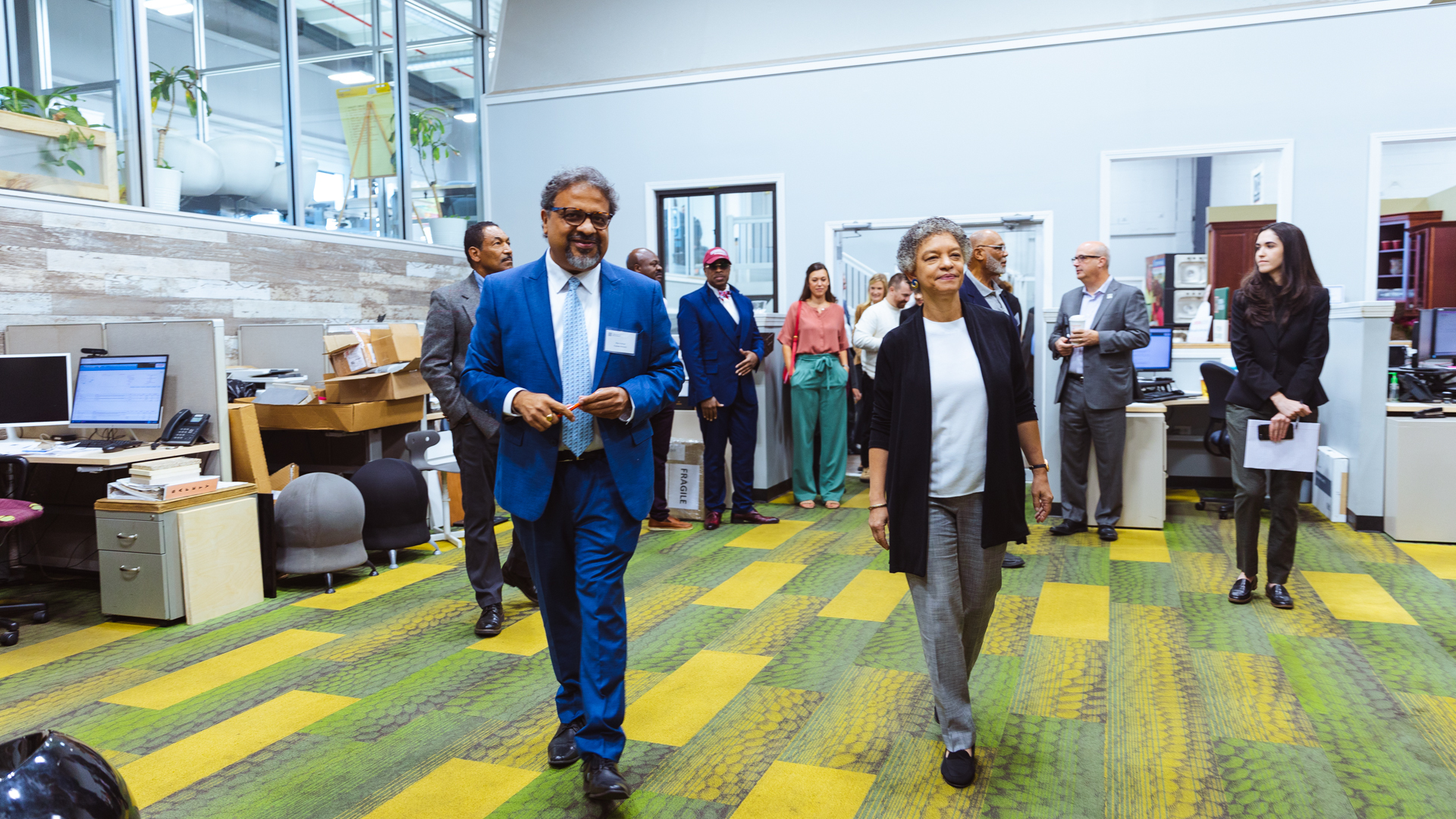In first regional trip, new Boston Fed president meets with Hartford business, nonprofit leaders 
Collins to continue visits around New England to learn about economic challenges 
For more than 15 years, Yvon Alexandre’s business, Caribbean Import Products, has supplied Hartford with wholesale groceries and goods from Jamaica. But like many companies, it’s struggled recently with supply chain issues and “sky-high” shipping costs.
A 20-foot container that used to cost about $4,500 to ship is now up to $6,500, he said. And shipping times have doubled or even tripled.
“We used to be able to place an order and get a container within four weeks,” he said. “Now it's taking eight to 12 weeks, and many times a lot of products are out of stock.”
Alexandre was among several Hartford business leaders who shared their stories and concerns with Federal Reserve Bank of Boston President and CEO Susan M. Collins on Wednesday. It was Collins’ first visit to Connecticut since starting the job, and she also met with community advocates, leaders of nonprofits, and members of the Bank’s Working Cities Challenge community development program.
Collins plans to travel to more New England states in the coming months to meet with people like Alexandre. She said it’s all part of learning first-hand how residents are coping with economic conditions, from rising costs of living to labor market issues.
“Yes, we look at statistics and we try to understand what’s happening in that perspective,” Collins said. “But it’s really important to hear on the ground what people are experiencing, what things are actually like, and I’m here to listen.”
9 images

Business leaders share ongoing impacts of COVID-19, struggles to retain workers
Local businessowner Max Kothari, a member of the Boston Fed’s New England Advisory Council, helped organize discussions for Collins with leaders of both large and small Hartford companies. Many spoke of difficulty hiring and retaining employees, adjusting to inflation, and recovering from COVID-19.
Alan Lazowski – founder of Hartford-based LAZ parking – told Collins he had to lay off employees for the first time in decades during COVID-19.
“The pandemic was extremely difficult for us,” he said. “We’d never furloughed one employee in 40 years, and (during the pandemic) we had to furlough 7,800 people, which was devastating.”
Now, during the recovery, Lazowski said he’s having the opposite problem: He can’t find workers. The company now employs about 13,000 people across the U.S. and is still looking to fill 1,500 jobs.
He said one method that’s worked to fill vacancies is building relationships with incarcerated citizens about six months before they’re released, to ensure they have job offers and mentors ready. He said about 1,000 LAZ employees nationally are former prison inmates.
“Some of those employees have become our best workforce,” Lazowski said.
Connecticut Working Cities teams discuss progress in workforce development
Nonprofit leaders and community advocates told Collins that there’s often a mismatch between open jobs and residents’ skill sets or work experience. To help solve this problem, Working Cities Challenge team leaders said they’ve organized programs to help community members with job training and application assistance.
The Working Cities Challenge, part of the Boston Fed’s Working Places initiative, is a grant program focused on promoting economic development in smaller, post-industrial cities.
In Waterbury, Working Cities team leader Tomas Olivo said the team has provided training for residents looking to open licensed home-based child care facilities. So far, 15 new facilities have opened, providing jobs and a desperately needed service to families, he said.
East Hartford Working Cities leaders Amy Peltier and Yadira Jeter discussed the team’s Professional Skills Academy. They launched a five-week career readiness academy with Goodwin University in East Hartford with the goal of connecting residents with local employers and unions. Over the next three months, they’ll continue working with participants who are job-searching, they said.
“We were trying to fill the gap between folks saying, ‘We need training,’ and employers saying, ‘We will hire anyone as long as they’re career-ready,’” Peltier said.
Collins said Working Places shows how important collaboration is in building a “vibrant, inclusive economy.”
“We have to work together (and) learn with and from each other to understand what’s working well in our economy, what’s not working well, and how we can bring people together,” she said.
Learn more about Collins’ perspectives on the economy here.
Media Inquiries? 
Contact our media relations team. We connect journalists with Boston Fed economists, researchers, and leadership and a variety of other resources.

 About the Authors
About the Authors
Amanda Blanco is a member of the communications team at the Federal Reserve Bank of Boston.
Email: Amanda.Blanco@bos.frb.org
Site Topics
Keywords
- Connecticut ,
- Susan M Collins ,
- Small Business ,
- economic development ,
- workforce development ,
- working cities challenge






